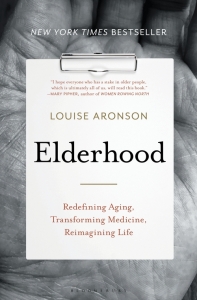RECOMMENDED READING
ELDERHOOD: REDEFINING AGING, TRANSFORMING MEDICINE, REIMAGINING LIFE
Louise Aronson
 In a recent interview at Kepler’s Books in Palo Alto, Louise Aronson called her new book Elderhood a “battle cry.” She is a woman on a mission, to create a culture where the decades of life after 65 are celebrated rather than feared, and medical schools and practitioners understand and support the many phases of “elderhood.”
In a recent interview at Kepler’s Books in Palo Alto, Louise Aronson called her new book Elderhood a “battle cry.” She is a woman on a mission, to create a culture where the decades of life after 65 are celebrated rather than feared, and medical schools and practitioners understand and support the many phases of “elderhood.”
Aronson takes on today’s ageism with an intense clarity and the radical proposition that aging is not a bad thing: “We approach old age as a singular, unsavory entity and fail to adequately acknowledge its great pleasures or the unique attributes, contributions, physiology, and priorities of older adults.” In fact, “by their later sixties or early seventies, older adults surpass younger adults on all measures, showing less stress, depression, worry, and anger, and more enjoyment, happiness, and satisfaction.” Aronson likens our culture’s anticipation, and narrative, of elderhood as a time of loss and irrelevance to “looking at parenthood and seeing only the months of sleepless nights with a screeching, colicky baby or the midnights waiting and worrying about an increasingly distant and reckless teenager.” The concerns with which we face old age, while real, “represent just part of a much larger picture.”
Although her mission is clear, the book, Aronson tells us at the start, is “not a straight line from here to there.” Rather, Aronson presents her arguments through a deeply thoughtful and well-supported collection of stories, history lessons, scientific data, literary quotations, popular culture references, and experiences drawn from her decades as a geriatrician and her own and others’ difficulties in getting compassionate medical care. The writing is propelled by Aronson’s ingrained empathy for her patients and her fury at a medical establishment that has often failed them.
Aronson puts her storytelling talents on full display in illustrating those failures. There is the elderly deaf patient who, before being admitted to the hospital for treatment of a blood clot, left his expensive hearing aids at home so as to not lose them, only to have a doctor conclude that the patient must have dementia because he couldn’t answer their questions. A 94-year-old African-American woman, fading in out and out consciousness in the emergency room after years of being bedbound and fed through a tube due to a stroke, is given a tox screening –based, Aronson suspects, on racist assumptions about drug abuse. A social worker, a nurse, and a doctor share their stories and guilt about patients they could have saved with additional medical interventions but, honoring their patients’ wishes, chose not to provide. Only after relating this scene does Aronson tell us she was that doctor.
At its heart, though, the book conveys a sense of optimism precisely because it succeeds so well in painting a new picture of what elderhood is and can be. As Aronson points out, for many people that phase may well be longer than either the childhood or adulthood that preceded it. If Aronson’s prescriptions take hold, the best years may still be the ones in front of us.
 This article was recommended by Susan Nash, Visiting Scholar at the Stanford Center on Longevity.
This article was recommended by Susan Nash, Visiting Scholar at the Stanford Center on Longevity.


